Mobile app development encompasses not only B2B and B2C sales but also the internal business functions.
It’s time for businesses to acknowledge the fact that those who use enterprise apps get 240 additional hours of labor per year from their staff (as per a recent report).
Businesses have changed their internal organizational structures to work in the mobile-first environment in order to capitalize on how workers currently work and how they might be encouraged to increase productivity.
The modern worker is equipped to be more productive and generate high ROI by working conveniently on their mobile devices, such as smartphones and tablets, even when they are in the office thanks to concepts like enterprise mobility and enterprise app development.
In fact, it is stoking demand for new enterprise apps. In response to this demand, we’ve compiled a list of the top enterprise app development firms that can assist you in developing sleeker, more feature-rich apps that will improve employee satisfaction and streamline numerous organizational operations. We wager that in the future, you can have the best project made using them.
What is enterprise app development?
The process of designing applications for big enterprises that are tailored to their intricate business requirements is known as enterprise app development. These applications can be set up in the cloud and run on a number of different networks and platforms.
An enterprise application’s goal is to eliminate typical pain points and make it possible for users to execute a task quickly and easily. Certain functions and procedures are automated to give users the ability to complete tasks faster.
The development is essential to the success and widespread adoption of the app — and the impact that it can have on the world — whether it is a business application aimed at assisting businesses in paying their bills or an educational application assisting youngsters in learning.
Speed and scalability are key considerations when creating applications for businesses. Building components that are templated and readily scaled in the beginning will assure a more successful result in the end due to the nature and complexity of the workflows.
The likelihood that a mobile app will continue to meet (or exceed) customer expectations increases with how quickly a corporation can iterate and update the app on a regular basis.
Enterprise Apps Designed for the Modern Web
Check out the Obie case study. YML created, developed, and released Obie, a pioneering reproductive coach app that enables women to comprehend and control their fertility.
The world of consumer technology has transformed as a result of smartphones and other mobile gadgets. Mobile usage has surpassed desktop usage and will only increase in the future.
Demand for mobile applications that provide education, enterprise platforms, and tools from a portable device is increasing along with the mobile market.
According to a research, of the mobile market in 2020, there were 218 billion downloads of new mobile apps, a rise of 7% year over year.
Business apps were the second-most popular category in the Apple App Store as of March 2021, accounting for 10.11% of all apps (the first being games). Education and lifestyle were the next two most popular categories, respectively.
Businesses who design their goods initially for mobile are in a better position to iteratively improve them to better meet user expectations. The focus of YML’s app development expertise is on quickly and efficiently creating cutting-edge mobile applications.
Modern corporate software development attempts to shorten the time it takes to develop applications while also being able to create all the components of web applications required for the modern enterprise.
By efficiently automating the process, streamlining development workflows enables a business to generate better experiences more quickly. Faster builds enable more testing and releases, which ultimately boosts customer satisfaction.
Related Reading: The Best Wearable App Development Companies in The World
Features of Modern Enterprise Applications
The following aspects are crucial elements to take into account while making plans to design a modern enterprise application.
Automation
Repetitive tasks are managed and automated via an efficient smartphone app. End users can perform workflows more successfully and efficiently by saving their steps.
Machine Learning Technology
Utilizing artificial intelligence and machine learning is another effective technique to continuously automate tasks. This gives the app more knowledge about how to function better while also assisting in its own improvement.
Data management
Enterprise applications should feature intelligent automation, predictive analytics, and an efficient data management strategy. The capacity to use data benefits staff decision-making as well.
IoT
The term “Internet of Things” (IoT) refers to a system of interconnected physical things that communicate with one another and share information. Applications can acquire more data and further streamline operations when using IoT devices to monitor operations in a safe, well-built infrastructure.
Emerging technologies
Functionality and application compatibility must change as technology does. Future editions of the software will take less time to construct if it can interface with upcoming technologies (or at the very least, be quickly updated to).
Mobile app security
It’s crucial that a mobile app be created with security in mind in order to both avoid and defend against any potential assaults in the future and to safeguard the application from dangers on the browser and server.
Accessible Documentation
An enterprise application should have programmes to assist with education on the code, processes, and any steps required for troubleshooting from both the internal and client perspectives. A development company should offer comprehensive documentation of what was constructed and its intended use.
How can you create an enterprise app?
Building enterprise web applications is essential for the success of your company. But how do you go about it? In this blog, we define enterprise web applications and explain how to create a successful enterprise web application.
What Is an Enterprise Web Application?
An application utilized for crucial or profitable operations is referred to as an enterprise web application. Using PHP, a lot of business web apps are created.
What’s the Difference Between a Web Application and Enterprise Application?
Any programme created to function in a web browser is a web application. A web application utilized for mission-critical or revenue-generating objectives is known as an enterprise application.
You’re probably using PHP to develop an enterprise application, just like many cutting-edge development teams do. PHP helps you work more quickly. It also guarantees that web applications meet or surpass requirements for:
- Availability.
- High performance.
- Scalability.
- Security.
- Cost-effectiveness.
- Continuous delivery of new features and new applications.
Why Are Enterprise Web Applications Important?
For businesses to succeed and to please their clients, building enterprise web applications is crucial.
Customers want rapid gratification while using web applications. They wish to have access to whatever they choose at any time. If they can’t, your company’s income and reputation are at danger.
Enterprise web apps must be accessible at all times. To fulfill peak demand, they must scale. They also require outstanding performance.
PHP serves as the basis for enterprise web applications for businesses of all kinds. Enterprise PHP, however, has various requirements for availability, security, and performance. Here, our attention is on achieving these standards.
How to Build an Enterprise Web Application?
So, how do you create an enterprise application?
PHP offers an easily accessible path to quickly building robust websites. But that accessibility also carries a price tag in the long-term.
Some PHP projects start small but quickly grow. This burdens development and IT teams. For instance, they’ll have to deal with administration and maintenance. And they might rely on community support for critical issues or security vulnerabilities.
Here we walk through how to build an enterprise web application successfully.
1. Define Your PHP
Is the application used for mission-critical or other revenue-generating purposes? If the response is affirmative, you are using business PHP.
2. Deploy and Manage Changes to Applications Effectively
Effective application change management and deployment are essential. A lot of developers encounter delays while releasing code to production. Or they have programmes that function in tests but not in actual use. Additionally, some people find it challenging to keep up with the deployment speed. They might forgo important client and corporate demands.
The application may be significantly impacted by configuration changes. Even outages result from these adjustments. Continuous watchfulness is necessary to protect these applications from outages or service interruptions. It also needs a supported, integrated technology stack.
Run-rate development work is frequently included in ongoing management and administration. This takes time away from other worthwhile endeavors. Additionally, it lowers developer satisfaction.
This routine task can be automated to speed up delivery, increase employee happiness, and eliminate any chance of human error.
3. Ensure Performance and Availability
Web apps must function, period. Through both slow and busy periods, consistently throughout all time zones.
Users expect immediate response times. In fact, there is a 7% drop in purchase conversions for every second that a website takes to load.
Here’s an example: Every day, an internet retailer makes $100,000. The annual revenue loss from a 1-second page delay might be $2.5 million.
It involves more than just keeping the servers running to maintain availability. A problem that results in an application acting erratically or becoming unresponsive must also be avoided.
This has serious repercussions, including lost direct sales from customers unable to finish their transactions.
- indirect sales loss resulting from prospective consumers who never proceed to the purchasing stage.
- increased response operating expenses.
- losing data
The following are necessary for enterprise PHP performance and availability:
- avoiding, identifying, and fixing problems before they affect performance.
- automatically balancing workloads to improve performance
- One-click rollbacks to the last functional state are available.
- always-on professional assistance.
4. Build in Security & Enlist Support
Numerous security flaws are typically present in unsupported PHP versions. They also provide a useful hacker strategy. In order to avoid the most recent security updates and upgrades, hackers do this.
Upgrading to the most recent PHP versions is difficult, though. It is typically put off in favor of other user or business-driven improvements.
Keeping up with the latest security patches and updates is also important. This holds true for both commercial and open-source software components.
What Are Examples of Enterprise Applications?
Enterprise applications include websites like Wikipedia, Vimeo, Etsy, Yahoo, Flickr, MailChimp, and Badoo. Each of them is dependent on PHP.
Actually, roughly 75% of dynamic websites throughout the world are powered by PHP. Open-source application frameworks like Drupal, Magento, and WordPress are built on top of it.
Related Reading: The Best Custom Software Development Companies in The World
How much does it cost to build an enterprise app?
How much does it cost to create an app for your business? It is the first consideration you should evaluate when estimating how much it would cost to build an app in 2022.
The typical cost at a rate of $40 per hour will be as follows, depending on the complexity of the app development:
Cost of developing a simple app: $40,000 to $60,000
An average app costs between $60,000 and $150,000 to develop.
Cost of developing a complex app: from $300,000.
Here, you can find out more about how to choose an app development company, the factors affecting application expenses, and unadvertised application development charges.
The cost to create an app may easily exceed estimates due to the functionality of the app.
You can get an estimate for your app project in a variety of ways. The most dependable approach is to get in touch with the developers. However, you can also make use of the app’s cost calculator.
If you ask the development studio to estimate the typical cost range of developing a bespoke app, the cost will likely only be an approximation in the absence of sufficient documentation and terms of reference.
However, the appropriate and accurate cost estimate must consider a variety of mobile app development services as well as the required amount of time:
- – the number and complexity of screens
- – the development process
- – the quality assurance stage
- – the quantity and complexity of features
- – the complexity of the database
- – quantity and complexity of integrations with third parties
- -application of security standards like HIPAA or GDPR
- – team size and experience level.
Over 100,000 new apps are often released on Google Play each month, while over 30,000 are released on the Apple App Store (Statista)
Free apps dominate the app development market. The most common and effective pricing philosophies are free and freemium. For instance, 92% of all utilities on the Apple App Store are completely free (Statista)
The mobile app market will bring in $581.9 billion in 2020. If this trend holds, industry sales in 2023 will be very close to $1 trillion. (Statista)
The mobile app development market is anticipated to grow by more than 18.4% and reach a $407.31 billion industrial value by 2026. (Business Wire)
About 90% of people’s time is spent on apps. Soon, people will spend 4 hours per day using a mobile device, with application use making up 88% of the time (Tech Crunch)
66% of smartphone users download games. Users are simultaneously downloading web browsers, messaging, and communication apps in excess of 95% of all users. (Statista)
The price of designing an app is significantly influenced by the kind of application.
Examples of App Development Cost
You can discover examples of applications, their costs, and the length of time it took to develop them, below.
Based on our personal experience, it is simply intended to offer you a general sense of the cost associated with developing an app, not the actual cost of an app.
Example #1: Tinder
One of the most well-liked dating apps is Tinder.
It raised $485,000 in seed money the year it debuted on the market, in 2012.
Users find Tinder’s functionality to be quite straightforward. Simply using the swipe right or left to like or dislike someone is all there is to it.
The application generates a match if the person you liked reciprocated.
A similar application might cost as much as $70,000 and take 1,000 hours to complete.
Calculating the cost of a dating app like Tinder involves taking into account features like:
- – authorization,
- – GPS location, settings,
- – user profile,
- – matching functionality,
- – push notifications,
- – communication,
- – and 3rd party integration.
Example #2: Ikea
An application for the company Ikea was created with the aid of augmented reality. Almost all of the furniture images in their catalogs are 3d models.
These programmes raise the cost but provide many functionalities because of the numerous new features and integrations, as well as security considerations.
A similar application may cost $45,000 and take 1,000 hours to complete.
The design of the mobile app has the following features:
- 3D visualization of the products
- compliance with social media sharing
- 360-degree view of the products
- real-time dashboard and analytics
- CRM integration
Example #3: Uber
A good example of a ride-hailing app is Uber.
However, an app like Uber actually has 3 applications: a web application for the admin panel, 2 mobile applications for the passenger and driver.
Therefore, the budget for developing apps should account for 3 different applications.
A similar application may cost $50,000 and take 1,200 hours to complete.
The app’s features include:
- payment integration,
- geolocation,
- routing and advanced route optimization,
- SMS and push notifications integration,
- and more additional features.
Example #4: TikTok
TikTok is a well-known social media platform for sharing videos.
The number of features and functionality an app like TikTok offers can affect how much it costs to build.
The cost of such an application can start from $70,000 and can take about 1,200 hours.
Features of the app include:
- – online messaging,
- – video calls,
- – multi-language support,
- – sharing images, videos,
- – user connecting, and much more.
Example #5: Airbnb
Airbnb is an example of a thriving marketplace app.
Typically, a marketplace is the fusion of an on-demand app and e-commerce store. Due to this, the mobile app cost and development time will be higher.
The cost of such an application can start from $75,000, and it can take about 1,000 hours.
It will have some advanced features like:
- – Search for available living units and last-minute booking,
- – Save list for favorite homes and places,
- – Co-planning of a trip and referral system,
- – Advanced booking workflow including date, check-in, and more details,
- – In-app chat, and more.
Now you understand how much it costs to develop applications like well-known startups, so it’s time to look at the factors that affect the app costs.
Related Reading: The Best React Native Development Companies in The World
Factors that Affect Enterprise Application Costs
Prior to developing the mobile application, you must grasp how to build an app, select a coding platform, and conduct a target audience and business objective analysis.
The application’s buttons, screens, and other components give it its individuality and convenience, but each more component increases the cost of the project as a whole.
Therefore, it is crucial to pre-develop a prototype and consider every aspect of the functionality.
The subsequent price-determining factors are influenced by this feature.
Three factors will determine how much it will cost to create an app:
Starting with the intricacy, we shall go into great detail about each of these three factors.
Factor 1. Complexity Level of App Development
You will need less time to design an application that is smaller and simpler. You must choose the scope of the approaching job when it comes to the timing of the application development.
How many features will the product include in total? What number of screens, buttons, and features will it have? How intricate will the business logic be in the application?
The features and integrations you select, as well as the method used to have an app produced, will determine how sophisticated the app is.
Type of complexity
Simple apps are those that only include the necessary functionality, low-tech screens, and UI solutions. They are those that are built without any additional benefits.
Mid-level apps have more complex features to provide, like API integrations, more screens, custom user interfaces, and real-time chat capabilities.
Apps with complex features include those with several functions, real-time synchronization, chatbots, media processing, UI animation, and many other features.
The founder must consider the intricacy of the software they intend to build in order to determine how much it will cost.
The terms of app development in each category will be as follows if we’ve selected a whole expert development team for your project, including a project manager, UI/UX designer, iOS or/and Android developer, a backend developer, and a QA engineer:
- – 2 to 4 months for simple apps
- – 6 to 10 months for mid-level applications
- – Complex applications: eight to one year or longer
The size and level of complexity of the project have a significant impact on how much it costs to develop mobile applications.
Type 1. Simple Complexity
It consists of basic features, three to four screens, simple functions, and no data storage.
That is an overview of a simple application.
Such an application will have the main features, including:
- – Login
- – Signup
- – Profile making and editing
- – Search
- – Notifications
- – Messages
- – Admin panel or dashboard
The cost will be determined based on a collection of features offered through the app.
Examples: A calculator app, time tracking app, notes app, social networks.
Type 2. Basic complexity: database and API-based applications
Why is a plane more expensive than a car?
Similar to this, increasing the features and databases will raise the price of developing an app.
You want to include some more functionality in these applications (other than the ones you find above)
- – Social Media Integration
- – In-App Purchases
- – Payment Portals
- – Geo-location
- – Location Tracking
- – Better Security
In addition to them, there is improved access and use of reliable infrastructure.
These applications call for additional synchronization, data storing, and retrieval from several databases.
Knowing the size of the consumer base can help you define the cost and price range when creating such an app.
Therefore, the cost of the programme will rise as complexity and feature count increase.
Examples include photo-sharing websites, taxi services, and meal delivery services.
The “average” complexity of an app determines how much more expensive it is.
Type 3. High complexity: feature-rich and large-scale applications
The sophisticated apps are made for major corporations.
In essence, the businesses either construct bespoke software without connectors or utilize custom software to connect to already-existing systems.
Because complicated apps tend to be legacy or custom software, their development expenses are typically greater.
The overall cost of developing the app may be substantially higher than you might anticipate.
The following chart shows how this type of app’s development costs vary:
Data Synchronization with more than two devices
- – Native features
- – Online streaming
- – In-App Calls
- – Messaging
- – Video Chats
Such applications not only require highly sophisticated development labor, but also intricate research and preparation for the mobile app development cost estimate.
Different infrastructure components are needed for the construction of dashboards and visualizations, the complexity of the development platform, the number of servers, and databases. Not to mention the demands for redundancy and high availability.
These can need extensive adjustments; the majority of the functionalities must be coded by the developers.
It can be challenging to estimate the cost and scope of an app project, especially before holding extensive meetings.
Examples include trading platforms, CRM software, business applications, and gaming apps.
A more complex programme, such as an enterprise or CRM, would cost more to design.
Related Reading: The Best Cross Platform Development Companies in The World
Factor 2. The Complexity of the Application Design
Now that we know how much it costs to construct an app, we can move on to the app design phase.
The development step wouldn’t be complete without the design phase.
To determine how much it will cost to construct the app, you cannot separate the two.
Designing is very similar to the development phase; as you add more features, the cost increases proportionately. (Learn more about the cost of developing an app.)
The cost estimate will also be constrained if you choose to create using templates, however additional alterations will increase the cost and lengthen the process.
There are a few things that we need to look at here as well.
Point 1. User Experience
UX focuses on the operation of an application. In UX, the screens are designed on a platform or on paper.
In the end, it also affects how much it costs to build a mobile app.The user interface of the programme should be straightforward.
To create that kind of experience, it is essential to comprehend the market, the consumer, your aims, and your objectives.
The cost to launch a mobile app varies depending on user engagement and design complexity.
Examples:
- – Button Placement
- – Color Psychology
- – Following the user’s eye pattern
UX design is one of factors, that define cost of developing an app
Point 2. User Interface and Visuals
The ins and outs of application design are numerous. But it starts with the user interface, or how the application will seem to the viewer.
You can make an estimate of the price based on how various graphic components are used. In reality, it affects MVP design costs as well.
A better outlook is merely one benefit of improved design.
Following the development of mockups that provide a visual representation of the solution, an application is designed.
The design will again depend on your objectives. What do you need out of your business app?
- – Engagement
- – Sales
- – Information
The costs associated with designing an app will also depend on the type of application you are creating.
- – Basic app
- – Authentication
- – Social networking
- – On-demand
- – E-commerce
- – Marketplace
- – IoTВ
Different types of applications require different design solutions.
- – Layout
- – Screen
- – Colors
- – Typography
- – Shapes
- – Elements
- – Items

Factor 3. The Platform on Which the App Will Run
We move on to the platform once we have an idea of how much it will cost to construct the app by taking complexity and design into account.
You must choose between two options:
Option 1. Develop Hybrid or Cross-Platform App
The term “hybrid” infers that the application will function on either Android or iOS devices.
This question is crucial in the exploration phase, which Spdload uses to determine how much an app costs.
Before boiling down to one platform, take three things into considerations:
- – Market Share
- – Device Fragmentation
- – Prevalence
All of these are based on the original market you plan to target.
Knowing the market might help you determine how much it will cost to design an iOS application. The same logic applies to Android smartphones, so you need to be aware of areas where iOS is more common than Android.
Although the app creation costs are different for the two platforms, the app development procedure is the same for both.
Cross-platform apps benefit from easy integration, slick performance, and access to platform-specific functionality.
This improves the user experience and lowers the app’s “how much does it cost” response.
A native app costs more to produce than a hybrid one. And it makes sense why this would be. Building two apps at once calls for twice the labor and resources.
Option 2. Develop a Native App
A native programme, as opposed to a hybrid app, only functions on Android or iOS.
Thus, you’ll need to employ 2 distinct development teams if you want to create an app using native frameworks for both Android and iOS. Two – one to develop an iOS version and the other an Android version.
The cost would undoubtedly double because different employees will need to be hired for various platforms.
You might be wondering how much an iPhone or Android app costs. The price to design an app for iOS and Android is the same, is the answer. The cost is the same for both, notwithstanding the differences in the technologies, SDK, databases, frameworks, and quality assessment systems.
The guidance on how much an app will cost also includes information on hidden costs.
The platform – how much does it cost to design an app for native or cross-platform?
A few additional costs add to the final answer of how much it costs to develop an effective app:
Functional costs as fees for third-party integrations. For example, SMS or push notifications, geolocation, or payment gateways.
Admin or management costs – For example, content manager salary.
Infrastructural costs – The payment for server, CDN, and integrations like Redis.
Support charges – Additional costs to update an application, fix bugs, or make future improvements.
Let’s look at the details (based on industry benchmarks). For example, it cost $75,000 to develop the app.
Depending on the number and load of integrations, they can cost anywhere from $5,000 to $20,000 per year.
Maintaining the application would cost 20% per year of the original development cost, i.e. $15,000
App marketing would cost 50%-100% per year of the original development cost, i.e. $75,000-$150,000.
Here are some suggestions to aid you in selecting an IT business that can complete your project requirements and produce the programme you require:
Tip #1: Decide on the requirements for your application
You must choose your application’s needs, the amount of funding allotted for its development, the intended development schedule, and the platforms on which it will be run.
Knowing the most common technologies for developing mobile applications is also beneficial because it will make it clearer to you what kind of application you need to create.
It will be quite helpful when selecting a mobile app development business because you may hunt for a specialist in the application type you need.
Tip #2: Try to choose full-service companies
You may be certain that you will receive qualified professionals if you choose from the software development businesses that have already established themselves and have an amazing portfolio of services.
If you work with such a firm, you won’t need to search elsewhere for further assistance or services because they will be able to give you all the resources you need at every stage of developing an application, including design, development, and testing.
Tip #3: Interview the developers personally
Take the time to ask the development team some crucial questions once you’ve located an app development company that’s ideal for you.
Ask them about their experience creating applications, share a few of your app ideas with them, and get their feedback on your project.
You will gain insight from such a discussion on how this company’s app developers see and are prepared to use your proposal.
Tip #4: Research the company’s portfolio
When the firm representatives are asked to name some of their finest apps, carefully examine them.
Consider whether you like the way these apps are designed and whether you think they are easy to use and functional.
It’s crucial to keep in mind that an application’s originality is one of the key components of success. Do you notice anything unique about this company’s apps, or do they just seem standard?
The security and privacy of your mobile application and the data related to your business must be thoroughly discussed.
To guarantee that your information is secure, developers should be prepared to sign a confidentiality and non-disclosure agreement with you.
Furthermore, it’s preferable to have a prior conversation on intellectual property rights. Before beginning work on a project, these and other facets of assuring the security of personal data must be discussed.
Related Reading: The Best Mobile App Development Companies in The World
Top Reasons to Have an Enterprise Mobile Application
Why should you start developing a custom mobile app now when your company is succeeding without one? Here are several justifications for working with an enterprise development firm to build specialized software for your business.
Transaction control and additional payment features
Retailers and other businesses using E-Commerce Payment Systems can particularly benefit from this one. A transaction-focused mobile app can help you better manage your finances, be completely aware of payment due dates, and set notifications for the parameters you need to know.
Improved data management
You can enhance processes involving data processing, analysis, verification, or correction with the use of a mobile app. In the big view, it can significantly impact the company’s overall effectiveness.
Eliminating paperwork and the human factor
By automating some operations and lowering the amount of paperwork, the aforementioned advantages enable professionals to concentrate on more complex problems and strategic objectives.
Mobile monitoring of employee statuses
You can create software that essentially relocates the office outside of office buildings with the aid of a business that offers enterprise mobile app development services. Your staff can use a mobile app to report on their progress while you have the option to track their development.
Employee onboarding and certification automation
Mobile apps can be a game-changer for large organizations in terms of streamlining the onboarding procedure. In the long run, automating just a few straightforward processes can save the HR professionals a tonne of time and work. Having an app that manages employee certification information can also streamline the workload for the HR division.
Better supply chain control
Mobile apps can be a game-changer for large organizations in terms of streamlining the onboarding procedure. In the long run, automating just a few straightforward processes can save the HR professionals a tonne of time and work. Having an app that manages employee certification information can also streamline the workload for the HR division.
Related Reading: The Best Android App Development Companies in The World
Which language is best for enterprise applications?
Utilizing an app for supply chain needs is another option to improve corporate optimization. The management, distribution, and planning of transportation in your company can all be improved with an app. You will discover an additional approach to save money with greater control and monitoring in this area.
Every programming language in use today has been specifically created for a particular purpose. The optimal programming language requirement is compatibility with other languages. Some businesses have already created the software based on their requirements, workforce count, and location.
Each language has its unique syntax and intended use, as was previously stated. You can also look at the distinctions between small-business and enterprise software development.
Nobody should ever compare one language to another because it’s possible that the second language was created for desktop applications while the first was for web development. Entrepreneurs nowadays are attempting to create software utilizing already-existing technologies like the iPhone or Android.
Before spending time and money learning a certain language, everyone should be aware of the market demands for programming. Java is regarded as the most well-liked yet efficient programming language for almost all computing requirements.
Professional programmers frequently use the aforementioned language to create both commercial and different mobile applications. Due to its business implementation, Java and JavaScript are attracting millions of users. Both languages are currently commonly used for server systems and desktop applications.
Which language is the best for enterprise applications?
Python
In terms of syntax and learning, it is one of the simpler languages. Although there has been a lot of demand for this language recently, it still has significant restrictions.
Java
For the development of server-side frameworks for video games and mobile apps, Java is a popular programming language. It is popular among many programmers because it serves as the main framework for building Android applications. It is designed to be small and work well across several platforms.
JavaScript
Since the network is so widespread, it is the second most admired favorite programming language. Nearly everywhere has it. JavaScript gives website developers the ability to include multimedia elements, which is felt throughout the internet.
C#
It is a widely used programming language that is nearly identical to Java for building Microsoft desktop programmes. This language will appeal to a person with good logic.
C/C++
It works well for low-level operations and small-scale operations. It is frequently used with device operating systems like Windows as well as embedded devices like the TV firmware or aircraft operating system. Since you have a greater understanding of how various languages work on the inside, learning how to build a kernel is simpler, but most web developers no longer need to do it.
How long does it take to build an enterprise application?
The stakes are uncomfortably high for enterprise apps since they can be both vital and sophisticated. One of the first things you’re certainly asking yourself if your team is thinking about creating a new enterprise mobile app or replacing an existing one is “how much does it cost to design our app?”
There are broad questions you can ask yourself that will help direct you toward an answer even though there are a variety of elements that influence the cost of designing and building an app. You must choose the type of team you’ll need, the procedure you want to use, and the total complexity of your app’s features before you can calculate a budget range that will help you create a roadmap for your app.
Intuitive development
You should take control of the development process as soon as MEAP (Mobile Enterprise Application Platform) can. Of course, it will need some time and technical knowledge to figure out what is happening, but it shouldn’t be too difficult. The best course of action in this situation is to establish your goals and look for a solution that will help you get there quickly. A plus would be some confirmed use cases in your sector.
Real-time updates
The capability for the solution to give you status updates on the development process is unquestionably a must. Without understanding where the development is headed, you don’t want to squander time or money, and you don’t need any unpleasant shocks.
Easy integration
Most likely, your business already has a computer system that is necessary for your daily operations. The infrastructure of your company must readily accommodate your new mobile app without experiencing significant disturbance. A versatile API that enables quick mobile app integration with your current business processes is essential. This functionality is crucial for the creation of mobile enterprise applications.
Security
Any firm should prioritize this in the present, especially in light of the vulnerability that an enterprise mobile app may introduce to your corporate data. It is difficult to overstate the importance of the software providers you select adhering to the most recent security requirements. In your app, all communication channels must be secured.
App management
You should start by keeping in mind this additional point. To manage your app, you must fully comprehend the range of possible settings. It’s crucial to monitor an app’s effectiveness and offer simple access control options for users. You can always quickly identify areas that need to be improved in the future by tracking your performance.
There is no such thing as the single best enterprise mobile application development tool; however, there are some tools you will definitely hear about during the development process.
How long does it take to create an app?
Is it possible to create an app in a week? Uncomplicated criteria and the use of purpose-built technologies can make this possible. However, you must adhere to the above procedure if you want to design and develop a product of the highest quality for consumers that addresses intricate business problems.
A typical app project will take between 3 and 6 months, split about evenly between UX/UI and development, depending on the functionality, the stakeholders involved, and the project management methodology used. It’s not rare to see 9 to 12-month schedules for big programmes that need specialized middleware development or extensive integrations.
Which are the best enterprise development app companies?
1. Ethervision – Best Enterprise App Development Company
They have developed 3 of the first 50 iPhone apps ever made and have delivered over 185 native apps until now. The team at Ethervision works to deliver a superior end-product to its clients.

2. Kilowott – Custom Software Development Company
Kilowott is a boutique business experience (BX) transformation firm accelerating growth for businesses of all sizes across industries by reimagining the way businesses operate and crafting digital experiences with the user at the core.
Kilowott’s design heritage coupled with their digital transformation expertise and deep focus on user experience helps them stand apart from the crowd. All their business experience transformation engagements focus on enhanced digital customer experience while driving up business profitability.
Kilowott’s enterprise app developers have extensive experience in developing solid, scalable iOS applications. Kilowott initiates enterprise application development for a variety of industries, throughout the world. They assist you in developing a solution that showcases your authentic voice in a store with millions of apps.

3. Intellectsoft
Considered as the smart place to begin mobile application development. Offices located in Silicon Valley, New York, London, Oslo and Minsk. Clients hire Intellectsoft for its honesty and authenticity through and through. Intellectsoft team has proven experience in developing enterprise solutions which gives them a unique insight for complex mobile app necessities. Because of its experience and expertise, Intellectsoft is also considered as one of the top players in the industry.
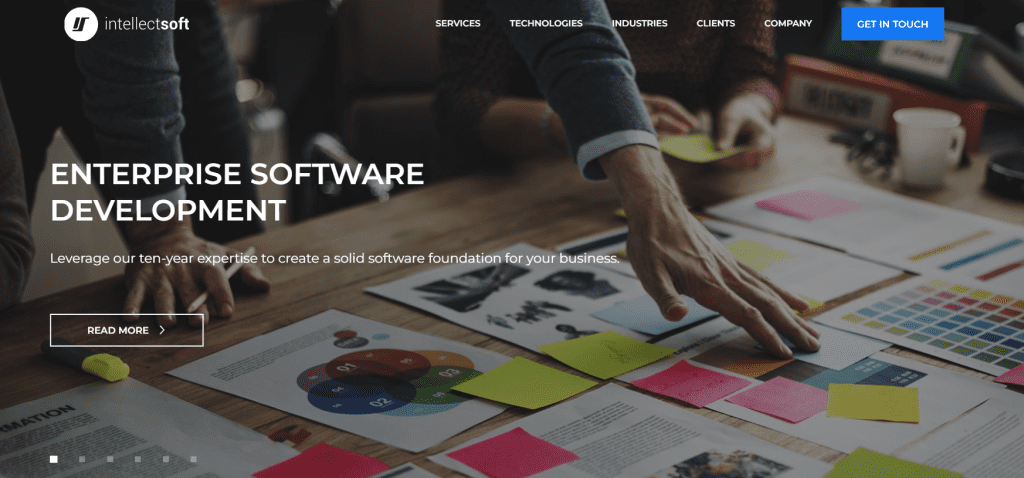
4. Domandtom
Dom & Tom is an end-to-end digital product development agency focused on emerging technologies. From startups to enterprise solutions the apps we produce for our clients support their strategic initiatives first and foremost through open collaboration, forward-thinking user experience, engaging design, and cross-platform development for both web and mobile. Dom & Tom has launched 500+ web projects and 120 native mobile applications with teams located in New York and Chicago.
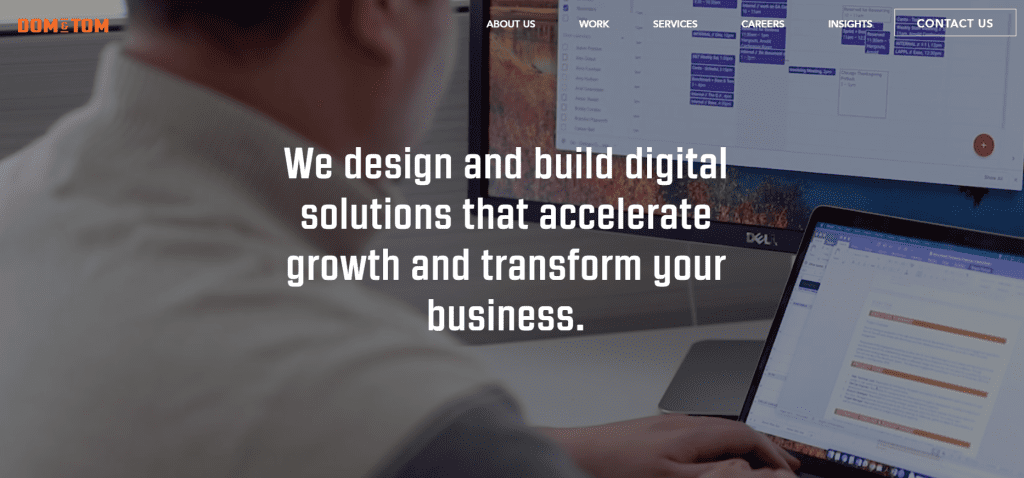
5. Willowtree Apps
WillowTree helps the world’s most admired companies launch applications that make a difference. Founded in 2007 as a mobile app and web development agency, the organization has grown with the digital ecosystem to support every stage of the product life cycle. WillowTree crafts digital products that solve business needs, drive market differentiation, and improve the user experience.
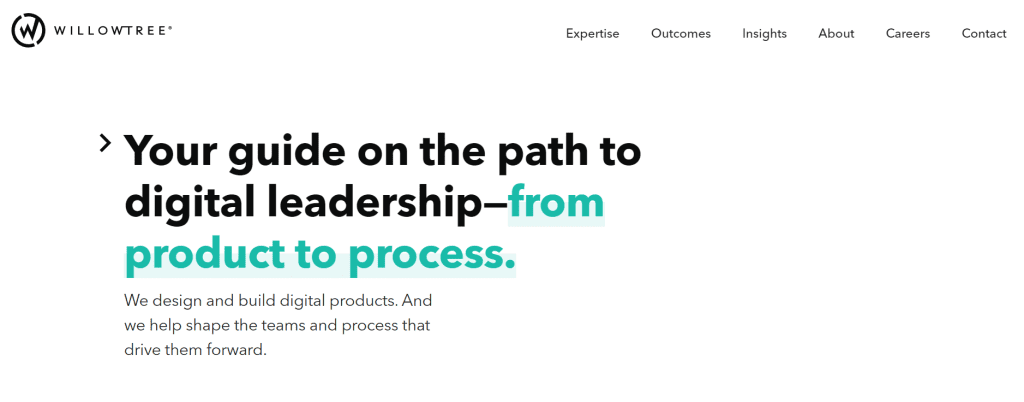
6. Softeq
Softeq is considered as an all-in-one solution provider and delivers high quality mobile applications according to client’s needs and specifications. Team of professionals and engineers expertise in both hard level and application level which is very rare to be found under one roof and famous for delivering on and on budget services.

7. Techahead
They are known for their perfection & excellence in the mobile app development industry. TechAhead provides mobile consulting, design and development services and has a wide clientele and is famous for developing dynamic, interactive, and user-focused mobile applications with a skilled team of working professionals committed to quality and time.
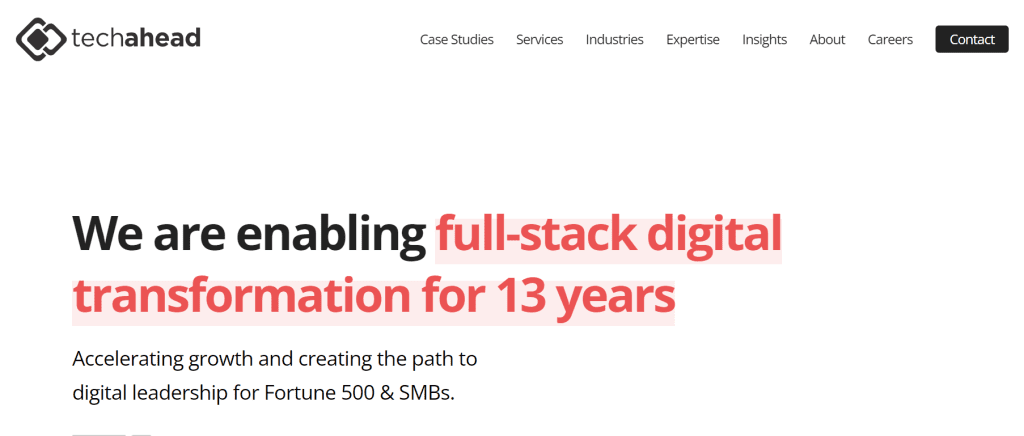
8. Leewayhertz
A leading mobile app development company and among the top most developers who deliver commercial apps for the iPhone Platforms. LeewayHertz consists of HIDE certified design experts and broad expertise developers for developing high quality enterprise solutions.
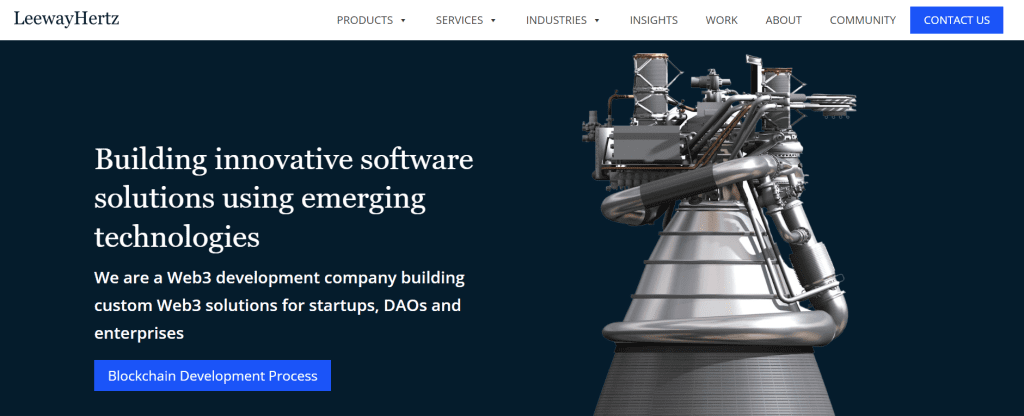
9. Zco
Hailing from the United States, Zco Corporation is a fantastic team of programming, design, marketing, project management business analysis and quality analysis experts. Blooming for over 15 years in the industry, Zco has an expertise in understanding client’s requirements and then implementing them to achieve best results that are loved client’s customers.
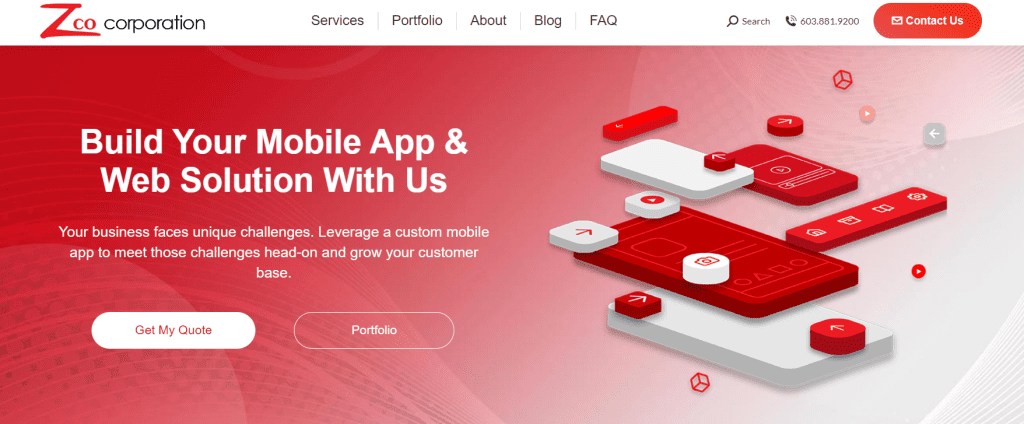
10. H&H
H&H is continuously showing growth year by year since 2012. With their efficient team of designers and developers, H&H has become a leading name in the market niche by delivering extraordinary solutions to its clients.
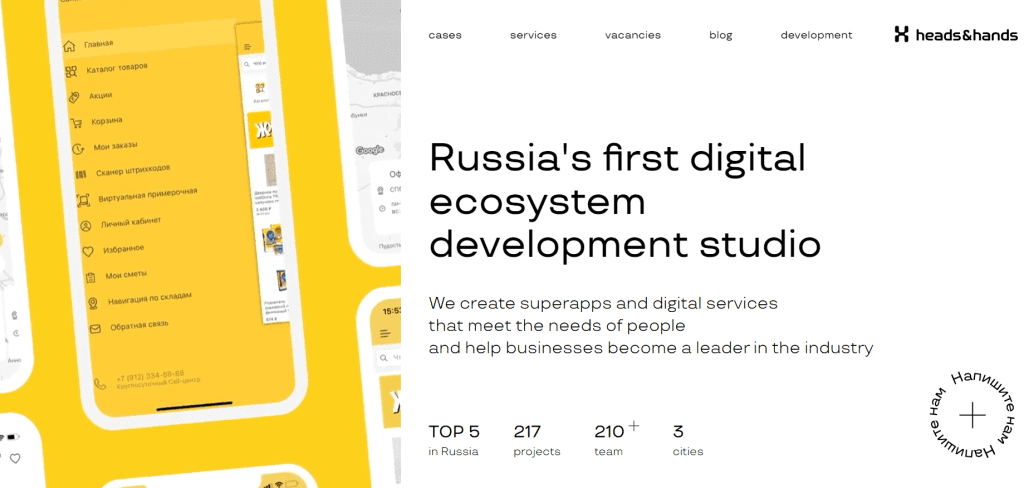
12. VRP Consulting
VRP Consulting is a global full-service Salesforce consulting, development and outsourcing partner delivering across the entire Salesforce platform. With over 500 people, across 13 offices in 8 countries, we think globally and deliver locally.
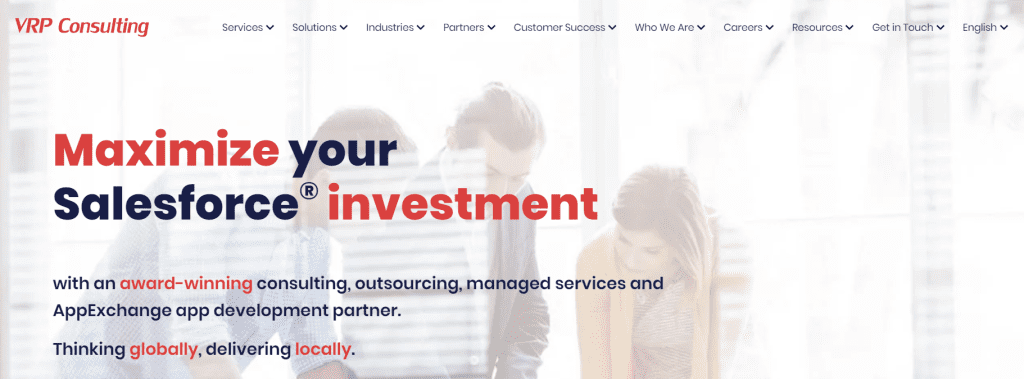
13. Cleveroad
Cleveroad team is your reliable partner in software design and development. Starting with an idea, through requirements analysis to UI/UX design creation and development, we work hard to drive value into every project we undertake. Having delivered over 130 software solutions, we gained vast expertise in iOS, Android and Web apps development.
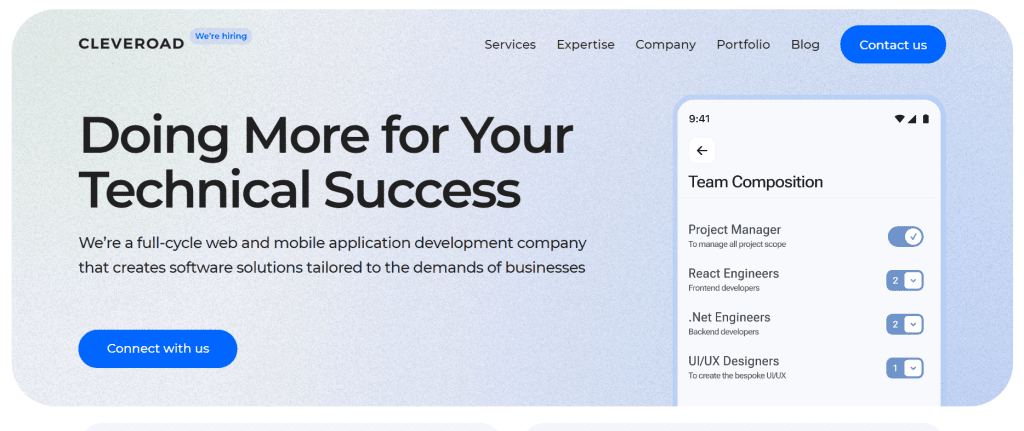
Need help with building enterprise apps to grow your business revenue? Let’s talk!






